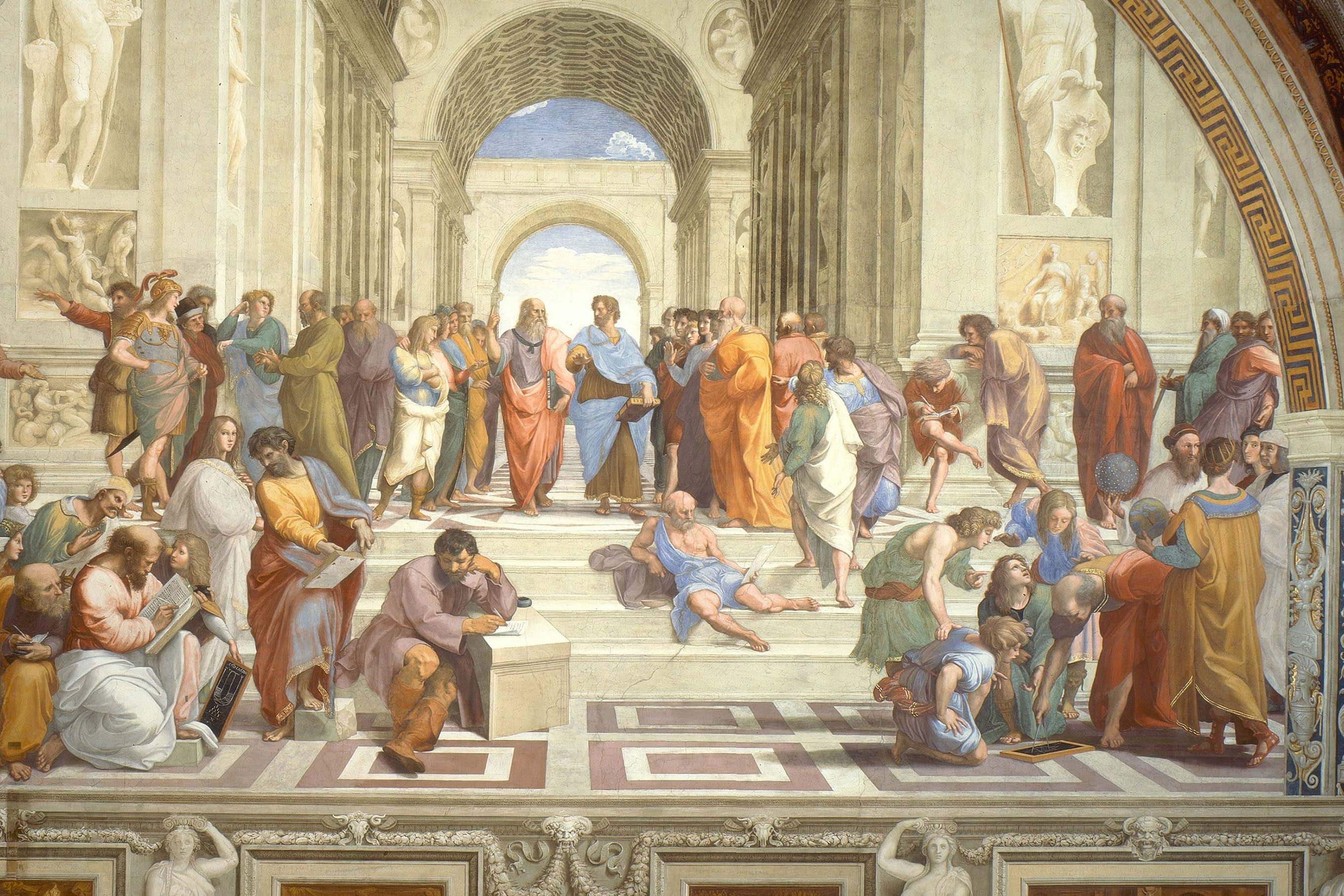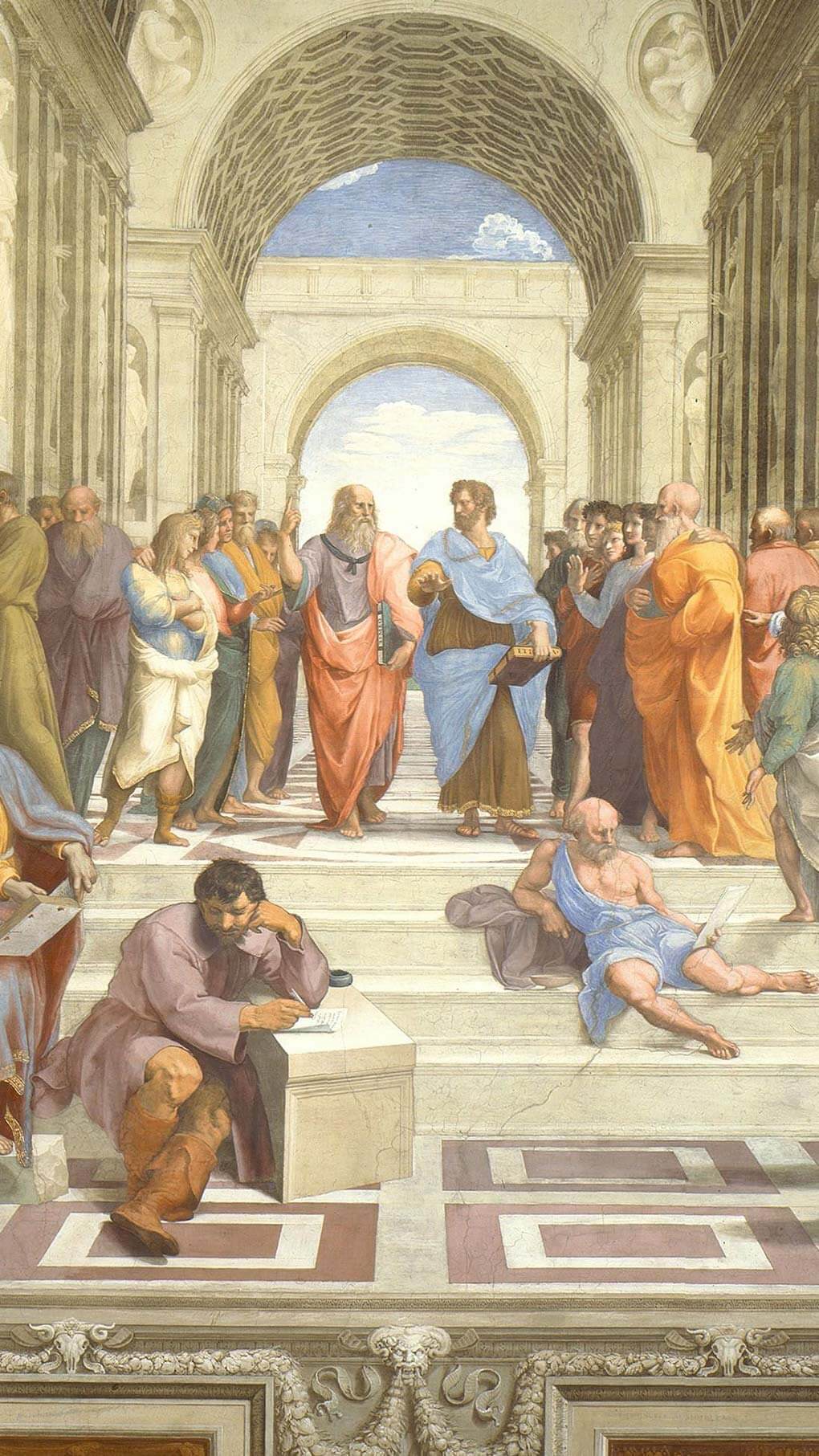Philosophy Courses
Minor: Philosophy (6 courses)
Course Details
The Story of Philosophy PHL-121
“Philosophy,” according to Socrates, “begins with wonder.” In this course, we will survey fundamental metaphysical, epistemological, and ethical issues raised by this “story that began with wonder,” starting with the quest of the ancient Egyptians, Indians, and Chinese and then moving on to the ‘Big Questions’ asked by the ancient Greeks, medieval Christians, and other modern and contemporary Western thinkers.
Logic PHL-122
This course introduces students to logic–both deduction and induction–and develops critical thinking skills in relation to arguments and their evaluation. Students will examine the role of worldview in relation to logic and arguments and learn to compose cogent written arguments. The course will cover such topics as the importance of language, logical fallacies, sources of authority, and elementary philosophical concepts and categories.
Faith and Philosophy PHL-210
In this course, students will explore how Christianity was shaped, and shapes, philosophy, and how Christian philosophy, in turn, plays a foundational role in academic study. Students will be introduced to key elements in Christian philosophy and
theology that will help them develop as human beings, Christians and students.
Required in Year 2
Asian Philosophy PHL-220
With the distinction between religion and philosophy being less clear outside the West, non-western philosophies–and Asian philosophies in particular–tend to offer students a different way to think about fundamental issues. Home to the majority of people on our planet, Asia also gave rise to some of the earliest and certainly some of the most influential philosophers in history, including Buddha, Confucius, Ibn Sina, Gandhi, and Mao. In this history of philosophy course, we will explore the development of the major religio-philosophical traditions of the Middle East, South Asia, and the Far East.
Ancient Philosophy PHL-222
Developing more or less parallel to the history course on Asian philosophy, Ancient Philosophy traces the beginnings of Western philosophy, focusing largely on ancient Greece and Rome. Particular emphasis will be on reading the entirety of what are sometimes known as “The Twin Pillars of Oxford University”–Plato’s Republic and Aristotle’s Ethics–though attention will also be given to major works in the Epicurean and Stoic traditions.
Medieval and Early Modern Philosophy PHL-224
This course explores the development of Western philosophy in two phases. The first phase takes us from the collapse of the Roman Empire and St. Augustine through to the development of the medieval university and Thomas Aquinas. The second phase explores key thinkers coming out of the “three Rs” – the Renaissance, Reformation, and Scientific Revolution – focusing especially on Machiavelli, Hobbes, Descartes, and Locke.
The Rise of Atheism PHL-226
The Enlightenment or ‘Age of Reason’ witnessed the rebirth of a radical new form of skepticism that started with Descartes. In this course, the ramifications of this skepticism are traced through the early atheism of Rousseau and agnosticism of Hume up to the crucial faith-reason divide of Kant. The subsequent post-Kantian explosion of atheism in both continental philosophy (Nietzsche, Heidegger, Foucault, Derrida) and analytical philosophy (Russell, Flew, Dennett) will be explored, concluding with some responses by contemporary Christian philosophers.
An Introduction to Reformational Philosophy PHL-228
This course introduces students to Reformational philosophy through a historical examination of modern and contemporary Reformed philosophers and the major philosophical issues they encounter. Key philosophers to be examined include Herman Dooyeweerd, Dirk Vollenhoven, and H. Evan Runner, as well as some Reformed Epistemologists such as Nicholas Wolterstorff.
Epistemology PHL-245
This course examines the development of epistemology in the Western philosophical tradition with a particular focus on modern epistemology. Themes such as epistemic justification, rationality, faith, skepticism, foundationalism, postmodernity, and truth are central to this course, as are the religious epistemologies of Christian philosophers Richard Swinburne and Alvin Plantinga.
Prerequisites:
PHL-121,
PHL-122
Aesthetics PHL-248
A philosophical consideration of art and art criticism, drawing on both classical and contemporary thinkers. Topics include beauty, expression, representation, aesthetic distance, the identity of the work of art, the relation of art to morality,
and the influence of art on perception.
Philosophy of Science PHL-314
This course explores the relationship between religion, science, and philosophy, starting with the ancient Greeks and then progressing through the major philosophers – including natural philosophers or “scientists”- of the medieval and modern eras. This philosophical exploration of science includes investigation into questions about the nature of, and relationship between, metaphysics, mathematics, physics, chemistry, biology and the applied sciences. In the modern era, we turn to key questions concerning the problem of induction, the status of scientific frameworks, theories of probability, feminist critiques and, as a case study, competing views of origins.
Prerequisites:
One other philosophy course
Ethics PHL-337
The first half of this capstone course will focus on ethical theories, primarily forms of deontological and relativist theories. Additionally, students will spend ample time discussing Natural Law, natural rights, virtue, and happiness. In the second half of the course, students will apply ethical theories to particular, individual cases relating to themes such as cloning, euthanasia, censorship, terrorism, and others.
Prerequisites:
Year 3 or 4 standing. PHL-337 is the Capstone Course for the Philosophy Department and is required for all majors in the 3rd or 4th year.
Metaphysics PHL-338
Students will study the nature, constitution, and structure of reality. They will discuss grand theories of everything, such as metaphysical materialism, idealism, and metaphysical dualism. They will also discuss the differences between existence
and essence and between substance, properties, accidents, and bundles. The course will clarify important distinctions between metaphysical realism and nominalism and between universals and particulars. Topics will extend to fundamental issues about personal identity, the nature of eternity and time, necessity and possibility, and others.
Prerequisites:
PHL-121,
PHL-122
Philosophy of Religion PHL-340
A treatment of philosophical issues as they arise in religious experience and in theological thought, such as the nature of religious language, the enterprise of proving God’s existence, and the prospect of defining or circumscribing religion.
Prerequisites:
One other philosophy course
Social Philosophy PHL-343
This course asks questions about the nature of society and culture. Major themes may include detailed discussions about societal institutions and concerns such as gender, marriage, race and ethnicity, church-state relations, culture-making,
education, and others.
Prerequisites:
One other philosophy course
Philosophy of Language PHL-345
A discussion of language and communication, focusing on such topics as speech, literal vs. figurative language, the nature of writing, the origin of language, and reification. Both classical and contemporary thinkers will be considered.
Prerequisites:
One other philosophy course
Philosophy of History PHL-355
A treatment of selected topics relating to historical consciousness and the nature of historical knowledge. Both classical and contemporary positions on historical explanations will be considered.
Prerequisites:
One other philosophy course
Philosophy and Superhero Mythology PHL-362
This course will examine the philosophy of mythology, a particular off-shoot of aesthetics, and relate to this one type of modern mythology-superhero mythology. Moreover, the particular themes to be mined in superhero mythology and culture are not merely of aesthetic interest, but reveal important perspectives on social, ethical, and metaphysical themes, all of which beg for a Christian philosophical analysis.
Prerequisites:
One other philosophy course
Environmental Philosophy PHL-366
A critical exploration of philosophical ideas that shape and promote environmental awareness, protection and stewardship, as well as those which are a hindrance to a Christian understanding of the subject.
Prerequisites:
Year 3 or 4 standing. ENV-366 is the Capstone Course for the Environmental Studies Department and is required for all majors in the 3rd or 4th year.
Special Topics PHL-370-79
This course provides students with the opportunity to pursue advanced studies on issues and themes of immediate significance in the field of philosophy. Seminars may be offered on topics where there is demonstrated interest on the part of students and faculty.
Independent Study PHL-385
For information on setting up an independent study see page 60 of the Academic Calendar.
Biomedical Ethics PHL-440
This course is designed to introduce the student to the relatively young field of bioethics. Topics include procreative technologies including in vitro fertilization, the creation and manipulation of human embryos for research, genetic testing
and interventions, and end-of-life issues including euthanasia and physician-assisted suicide. Some of these issues will be addressed in light of various ethical theories that have been influential among both Christian and non-Christian bioethicists.
Prerequisites:
Year 3 or 4 standing



